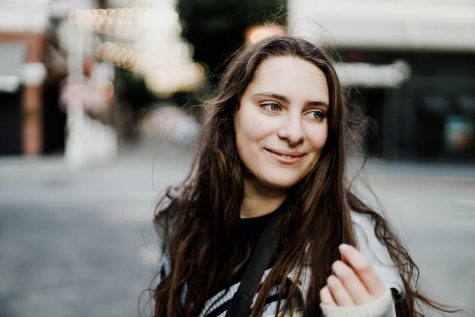
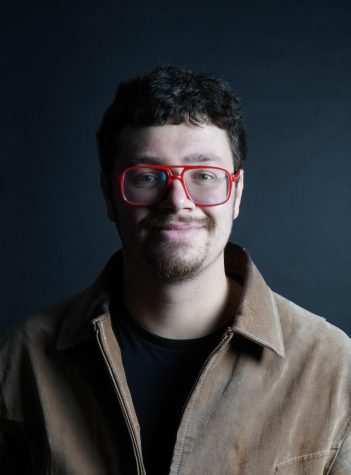
This article is part of a series that seeks to explain and examine aspects of how issues around the Israeli-Palestinian conflict impact students, faculty, the university administration and academic programs. It is the work of over 80 interviews and numerous conversations that took place over a year. Taken together, these articles are meant to provide an overview of certain aspects of these tensions on SF State’s campus — and are not comprehensive.
December 1, 2020
When Ben Lieberman first came to SF State, he wanted to bridge gaps between Jewish and Palestinian students.
He introduced himself to students in the General Union of Palestine Students. However, after becoming involved with SF Hillel for a Jewish community, he felt the students from GUPS perceived him in a more negative light.
“It’s been hard,” Lieberman said. “Certain Jewish students are like, ‘Ben what the fuck.’ But then some of the Palestinian students when they see me are like, ‘Oh, you’re with them, and they’re Zionist.’”
“It’s hard because I end up engaging more with the Jewish students who disagree with me, then I get to with the Palestinian students who maybe don’t realize I do agree with them — and I want to engage with them but it’s hard,” he said.
For Jewish students who find community through SF Hillel, alienation from parts of the campus community can follow. Seeing the intensity of tensions and feeling an expectation by others to feel strongly about the Israeli-Palestinian conflict has made many students avoid the issue altogether, repress their Jewish identity on campus or identify as Zionist or anti-Zionist because of the campus climate. As a result, Jewish students can struggle to find space at SF State where they can express their Jewish identity and engage in healthy discourse or learning opportunities on the Israeli-Palestinian conflict.
Sasha Joseph, who worked at SF Hillel for four years and was the first Jewish Student Life Coordinator at SF State for the Fall 2019 semester, said Jewish students often feel bombarded by questions or assumptions about how their Jewish identity relates to the Israeli-Palestinian conflict and Zionism.
“I think sometimes Jewish students just want to be Jewish, or just want to be,” Joseph said in an April interview. “They just want to wear their star of David and not be asked, ‘What are your thoughts on Israel-Palestine?’”
SF Hillel serves college students citywide, but its building is located blocks from SF State. Its staff facilitate social and educational programs and outreach activities on campus. It is meant to serve students’ religious, communal, cultural and educational needs.
SF Hillel is the only campus Jewish organization to have consistently served SF State students for decades, with documents dating back to the ’40s. It is an independent nonprofit organization, affiliated with Hillel International, the largest Jewish campus organization worldwide.
When most Jewish students come to campus, Israel is not at the front of their minds. However, after getting involved with SF Hillel or learning of the history of tensions at SF State, issues around the Israeli-Palestinian conflict can shape some students’ experiences.
Jason Steckler, SF State alum and former Israel Experience Architect at SF Hillel. “I basically went to college with not a strong background in my Jewish identity and upbringing. I’d actually heard from a friend of my mom’s after having been accepted to SF State but still graduating high school, that the campus was a hotbed for Israel-Palestine. And that it was particularly anti-Israel. At the time as a senior before college, when I heard that I didn’t care, like ‘This will have no effect on me because it’s not what I was gonna go to college for,’ to get into that conversation. Little did I know, that I dove headfirst deep within the first two years of college.”
Savannah Landau, SF State alum: “When I started here, even before I started here, my grandparents were very concerned about the antisemitism on campus. And I’m all the way from Southern California so the fact that they heard about it from there was like ‘Oh maybe that is something to look out for, but I’m still gonna pursue it.’”
Experiences differ among students because Jewish identity and heritage are diverse, and viewpoints, politics and definitions of Zionism and antisemitism vary.
Though not all Jewish students in SF Hillel identify as Zionists, those who do seek the Jewish community there often feel isolated from other student groups who are critical of Israel or oppose Zionism.
“If you’re a Jewish student, you’re kind of forced into this conversation whether you want to be a part of it or not,” SF Hillel President Ocean Noah said.
Noah said that while she doesn’t relate to Zionism the same way some students in SF Hillel do, as president she must account for their concerns.
She also said that pressure on campus to discuss or have a strong perspective about the Israeli-Palestinian conflict creates anxiety for her as a Jew of color.
“We have to think about other histories and colonization,” Noah said. “And I think that can be a very difficult conversation. Like, wow — what if my heritage is repeating some things that have been done to my other heritage? That’s very hard to think about, and I personally avoid that. It’s not fun for me.”
Opposition to Zionism and protests against Israeli violence toward Palestinians are common on campus. Other historical student groups show solidarity with GUPS concerning the conflict, such as Student Kouncil of Intertribal Nations, el Movimiento Estudiantil Chicanx de Aztlán, Black Student Union and the League of Filipino Students. These organizations also hold rallies for climate justice and undocumented students and stress solidarity in both international and local struggles against oppression.
SF Hillel employees and students involved with SF Hillel have said that other student groups frame SF Hillel as opposing these organizations’ goals and values, as they see Zionism and social justice as incompatible.
Gabe Smallson, student representative of SF Hillel and president of the Jewish fraternity AEPI, said that despite knowing about the tension on campus, he has only felt directly targeted by other students for being part of SF Hillel twice.
“I was just walking,” Smallson said. “And this kid is skateboarding by and yells, ‘Get the fuck out of here you fucking colonizers.’”
He said SF Hillel and AEPI have had some of their lowest membership numbers this past year. He and others speculate it is because Jewish students without a strong Jewish background or opinion on the Israeli-Palestinian conflict may not want to be openly Jewish or a part of these Jewish organizations because of what he describes as an anti-Zionist campus climate.
In November 2018, then-SF State students Jake Scheinberg and Lex De La Herrán attempted to create the campus organization American Jewish Student Activists after a white supremacist shot and killed 11 people at the Tree of Life Synagogue. Focusing on U.S. politics, the group sought to distance itself from assumptions others have of SF Hillel while providing Jewish students with a community that could build coalitions with other student organizations.
Though short-lived, the initiative represented an attempt by about a dozen students from SF Hillel to steer conversations on campus away from Israel and center their voices toward opposing antisemitism and promoting shared Jewish culture and solidarity for social justice in America.
In February 2018, a separate unofficial Jewish student group — Jews Against Zionism — was created in February 2018 as a space for anti-Zionist Jews on campus.
JAz started a few months after now-graduated Savannah Landau watched a documentary in class about an Israeli teen imprisoned for refusing to join the Israeli Defense Forces.
Landau, who noted she had never interacted with Palestinians before, said she went to the GUPS office and learned about the realities of many Palestinians that she was ignorant to before.
“I think what threw off my paranoia was them knowing I was Jewish, and they’re just like, ‘Yeah.’ And this little shrug like, ‘That’s not our issue,’” Landau said, adding that despite her initial hesitation she was warmly accepted. “And finally finding out the difference I guess of Zionism and Jewish identity.”
Landau found a new community in anti-Zionist Jewish students and those she met in GUPS. She described getting frustrated whenever Jewish organizations or individuals would accuse Palestinian students and professors of antisemitism for anti-Zionist sentiments. Her frustration extended toward the college administration for investigating several of the accused.
She and another anti-Zionist Jewish student started JAz in large part to counter the conflation of anti-Zionism and with antisemitism.
“We wanted to finally be the Jewish voices that are like, [Zionism] doesn’t have to be what Jewishness looks like anymore,” Landau said, adding that creating JAz strengthened her love for her Jewish identity. “This doesn’t have to define me.”
We wanted to finally be the Jewish voices that are like, [Zionism] doesn’t have to be what Jewishness looks like anymore. This doesn’t have to define me.
— Savannah Landau
Landau intended for JAz to be a voice for Jewish students opposing what she describes as the weaponization of antisemitism against Palestinians and anti-Zionist Jews. However, she said that since she formed the organization, it has been called a front for Palestinian students, and members have been called self-hating and ignorant. Some staff and students involved in SF Hillel have said that anti-Zionist Jews are a minority in the Jewish community and are seen as holding fringe viewpoints.
Landau said portrayals of anti-Zionist Jews as a minority in the Jewish community “further positions us as a frivolous group in the community and erases the violence that Zionism causes Palestinians and other marginalized groups, globally.” She said Jewish students were still fearful of joining JAz because they, like her, could be labeled antisemitic or a traitorous and self-hating Jew.
“I was afraid of being exiled by my family,” Landau said.
An Israeli-American student who spoke on the condition of anonymity shared similar fears.
The student said they originally felt discomfort seeing anti-Zionism and protests of Israel on campus, perceiving messages denouncing Zionism as inherently antisemitic. When they first came to campus four years ago, they didn’t know or care what the Palestinian flag looked like. It took talking to Palestinians on and off campus to begin understanding a narrative that the student had ignored and seen distorted in Jewish-American communities — and systemically erased in Israel.
“When you are Israeli, and you start off as a Zionist and you change or shift, it’s very emotional,” the student said. “It’s not easy for me. It makes me question a lot of things, and it could strain the relationships between you and your family. And I think that’s why people don’t want to.”
The student said that as they listened to the stories of Palestinians and connected with them over their years at SF State, their viewpoints changed. Though they want to attend a GUPS meeting, the student wouldn’t because their parents would be extremely unaccepting.
Though the student said they never experienced antisemitism on campus, they are currently uninvolved with Jewish and Palestinian campus organizations and don’t often tell people they are Israeli.
However, a body of students feels threatened and unwelcome by anti-Zionist sentiments expressed on campus that they say veer into antisemitism.
Some students said anti-Zionist protesters use critiques of Israel to target their Jewish identity or assume their views on Israel because they are Jewish or part of SF Hillel. Others consider their connection to Israel to be an intrinsic part of their Jewish identity.
“I feel that the Israeli-Palestinian conflict has created this image, this really ugly caricature of what a Jewish student is on campus,” Noah said. “And it’s someone that is maybe greedy or privileged to the point where you’re spoiled or called a colonizer or someone who wants to erase Palestinians.”
In 1985, right-wing and anti-Arab Israeli politician Meir Kahane, who advocated for the expulsion of all Palestinians living in Israel, was set to speak at an international relations class at SF State. The Jewish Student Action Committee condemned Kahane’s views and protested his visit, saying he did not represent most Zionists. GUPS, allied organizations and anti-Zionist Jews protested Kahane’s visit separately, stating that Kahane exemplified all forms of Zionism — including the beliefs of Zionist students in JSAC.
The sentiments expressed during the protests and letters to the school newspaper such as “Kahane, you are not welcome on this campus,” made some Jewish students, including those who opposed his visit, feel uncomfortable and unwanted on campus.
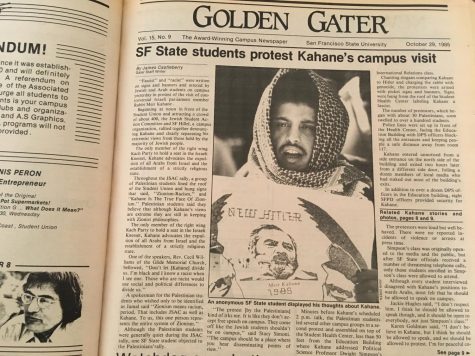
“It’s like they [Palestinian students] don’t accept free speech on campus,” Stacy Simoni was quoted saying in the Golden Gater in 1985. “They come off like the Jewish students shouldn’t be on campus.”
Jewish students said almost the exact same words in 2016, after student groups came together to protest then-Jerusalem Mayor Nir Barkat speaking at an event hosted by SF Hillel. Protesters wrote in a statement that Barkat enforced exclusionary policies and practices against Palestinians when he was mayor. Among the protesters were Jewish and other non-Palestinian students.
Some SF Hillel students attended to question Barkat’s policies. But amid the protestors shouting, “Get the fuck off our campus,” they felt a greater need to defend the event.
Students present filed complaints to the university, stating the administration unfairly handled the protest. A year later, the Barkat event became a centerpiece in a lawsuit against the university alleging institutional antisemitism. This lawsuit was dismissed with leave to amend twice in federal court before being dismissed with prejudice, though the university settled a similar lawsuit filed in state court.
Three SF Hillel students recently reminded the administration of some of the terms of the settlement in an open letter to President Lynn Mahoney, writing, “Our university made a commitment to address the systemic antisemitism and anti-Zionism on our campus.”
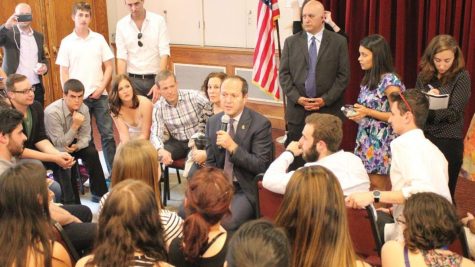
One of the students who signed the open letter was Zachary Weinstein, president of the Israel-centered student organization I-Team. Weinstein became involved with SF Hillel and I-Team over a year earlier after seeing a protest on campus. The protest was in response to Provost Jennifer Summit sending out a university memo listing Israeli Independence Day as a religious holiday, and not including Ramadan and Eid Al-Fitr — later said to be an error by Summit.
He recalled protesters chanting, “Causing pain since ’48.”
Protestors were referring to the expulsion and massacres of Palestinians in 1948 that is known as the Nakba — an Arabic word for catastrophe. Weinstein interpreted their protest and subsequent chants of “Zionism has got to go” as an attack on Israel’s right to exist.
“They were against Israel’s existence, not just current government policies,” he said. “That is what scared me, so I got active with Hillel.”
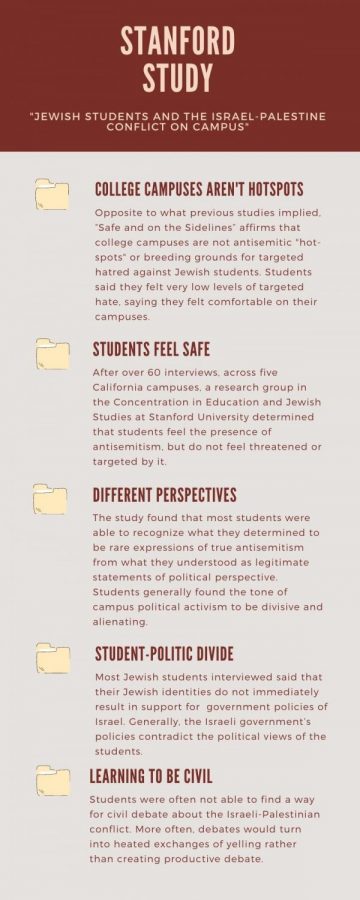
Weinstein has stood out as a vocal advocate for Jewish, Israeli and pro-Israel students. However, many Jewish students who see these tensions or feel discomfort over depictions of Israel and Zionism disconnect from the Jewish campus community or disengage from campus issues entirely.
This more common experience of American-Jewish students feeling both safe and uninvolved is illustrated in a report conducted by students in the doctoral concentration in Education and Jewish Studies at Stanford’s Graduate School of Education, “Safe and on the Sidelines.” It included interviews from 66 Jewish students on California college campuses — including SF State — who weren’t vocal campus activists. The research inquired whether the students felt safe on campus and whether they agreed or disagreed with depictions of campus as “hotbeds of anti-Semitism and anti-Israel activity,” to which the study participants disagreed.
An SF State student interviewed on the condition of anonymity said that after learning about the tensions on campus, they first became more involved in SF Hillel and aligned organizations such as the David Project. They wished to show that not all Jewish students on campus are pro-Israel, but they cut ties once they realized that SF Hillel was at its core a pro-Israel organization. This led them to ultimately disconnect from Jewish student life and hide their Jewish identity at SF State.
“I definitely never felt comfortable wearing anything openly that was Jewish,” the student said. “I never wanted to have my Jewish star open when I wore one. I never felt like it was something that I would openly want to be expressing for some reason. If the topic came up, ‘Oh you’re Jewish,’ Israel would follow, and I didn’t — I don’t — have a firm stance on it ’cause it’s a complicated issue, and so I didn’t like being constantly put on the defensive for that.”
“Generally with Jewish pride comes the assumption of Israeli pride. It’s like, ‘No, actually.’ So that I remember is the main thing, always needing to have an opinion on Israel, and it always being the wrong one depending on who you were talking to.”
Summary of “Safe and on the Sidelines,” a Stanford study conducted by the research group concentrating in Education and Jewish Studies. (Dyanna Calvario / Golden Gate Xpress)

